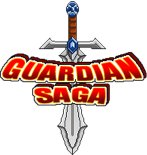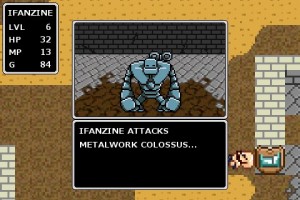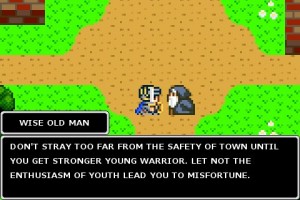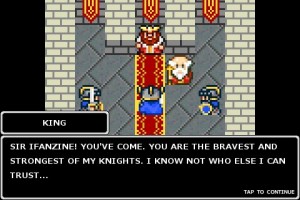 Welcome Back to 1986
Welcome Back to 1986
(Editor’s Note: What follows is the original review written for the first version the author played. Since then, one or more major critiques have been addressed by the developer. For a list of these, see “Addendums” below the original review score at the end of the article.)
It’s difficult to imagine, perhaps, but there was a time when many things that draw gamers to RPGs didn’t exist in the genre. Complex stories, party management, skill trees — all those niceties arose only gradually. 9th Bit Games has paid homage to an era in which the genre’s main draws were the player’s sense of progression and a nail-biting resource management challenge.
Guardian Saga (Out Now, $1.99) casts the player as a silent protagonist assigned to investigate what’s up with Guardian Beasts that have ceased protecting humanity from evil. While not particularly exciting, and lacking the excellent character dynamics that made Ash so enjoyable, Guardian Saga‘s story does a good job playing up a sense of mystery as the player wanders from town to town searching for answers. I found the game’s text very cleanly written, and at times rich enough that I’d love to see what 9th Bit Games could come up with should they ever try their hand at something more ambitious in the storytelling department.
 Absent the little spark of joy that usually comes with recruiting new characters, choosing a skill to learn, or encountering periodic minigames, Guardian Saga‘s appeal rests entirely on the challenge of budgeting the player character’s strength and resources while roaming its overworld and dungeons. My foremost concern – that the game would become a Level Up grindfest – happily proved unfounded, as the developer’s done a standout job with enemy balance in my opinion. Surviving any of its one-on-one encounters with monsters isn’t exceptionally difficult; what makes things dicey is that the player needs to judge when he or she has acquired sufficient equipment and curative items to complete a dungeon. That judgment has to be made by probing the current dungeon while relying on the nearest inn for cheap recovery, and this foray model of gameplay feels precisely correct for the style 9th Bit Studios was aiming for.
Absent the little spark of joy that usually comes with recruiting new characters, choosing a skill to learn, or encountering periodic minigames, Guardian Saga‘s appeal rests entirely on the challenge of budgeting the player character’s strength and resources while roaming its overworld and dungeons. My foremost concern – that the game would become a Level Up grindfest – happily proved unfounded, as the developer’s done a standout job with enemy balance in my opinion. Surviving any of its one-on-one encounters with monsters isn’t exceptionally difficult; what makes things dicey is that the player needs to judge when he or she has acquired sufficient equipment and curative items to complete a dungeon. That judgment has to be made by probing the current dungeon while relying on the nearest inn for cheap recovery, and this foray model of gameplay feels precisely correct for the style 9th Bit Studios was aiming for.
Genre fans weaned on modern RPGs will find Guardian Saga‘s battle system well under par for the course in terms of depth, consisting only of attack, spell, and retreat options — that’s right, items may only be used outside of battle. You’d be hard pressed to call it entirely un-strategic thanks to the fact that the jack-of-all-trades hero learns a range of spells as his level increases, and the player has to decide whether to hold his magic points in reserve for healing or whup enemies quickly with offensive skills. A battle speed option also helps, so players can rush through these bare-bones encounters just about as fast as they arise. Guardian Saga manages its simple gameplay well with an NES-style virtual D-pad and responsive menu buttons; the pagination buttons in town shop menus could stand some widening though.
 The number of retro RPGs on the market proves that there’s a sizable audience waiting to snap up these games, especially on iOS. However, I can’t help but miss some of the helpful staples more modern RPGs have developed. So you want to save your game wherever you need to? Hah, were you born after the year 2000 or something? You’re lucky Guardian Saga gives you a Bard to save at periodically so you don’t have to complete this in one ten hour sitting! Area minimaps? Real warriors don’t ask for directions! And don’t tell me you’re so lazy that you need an auto-compare function when sifting through swords and armor to buy at shops — that’s for wussies! Such is the design attitude 9th Bit Games unabashedly adopts here.
The number of retro RPGs on the market proves that there’s a sizable audience waiting to snap up these games, especially on iOS. However, I can’t help but miss some of the helpful staples more modern RPGs have developed. So you want to save your game wherever you need to? Hah, were you born after the year 2000 or something? You’re lucky Guardian Saga gives you a Bard to save at periodically so you don’t have to complete this in one ten hour sitting! Area minimaps? Real warriors don’t ask for directions! And don’t tell me you’re so lazy that you need an auto-compare function when sifting through swords and armor to buy at shops — that’s for wussies! Such is the design attitude 9th Bit Games unabashedly adopts here.
Modern-vs.-retro design theory aside, there are some things an iOS game needs simply because this is a mobile and multi-functional platform. I found this out all too abruptly when I switched the game to a background process to check on an incoming email — returning to find that Guardian Saga had defaulted to the start menu and forgotten the fact that I had just won a hard-fought boss battle with a Metalwork Colossus, let alone the fifteen minutes of trekking I had accomplished since my last manual save. That’s right, Guardian Saga lacks multi-task ability! I was ready to slash at the game’s score severely over this, but after all, the developer did provide a temporary quicksave option and probably expects the player to exercise this manually before dumping out of the game. Without fair warning that Guardian Saga lacks true multi-tasking, however, suffice it to say that players will welcome this missing functionality in updates.
 Screenshots communicate just about all that needs to be said about Guardian Saga‘s aesthetic presentation. Those who’ve already played offerings like Monster RPG 2 won’t be surprised by the 8-bit era pixel art in towns and dungeons, but 9th Bit Games has gone even further back in time. Battles contain only the most minimal special effects, and the best sprite art players will lay eyes on are the static pixelated mugs of the monsters staring right back at them. Guardian Saga has even painstakingly reproduced the feel of early NES-era chiptunes, which can carry a mood but not much of a melody. That, after all, wouldn’t be mastered until around 1988.
Screenshots communicate just about all that needs to be said about Guardian Saga‘s aesthetic presentation. Those who’ve already played offerings like Monster RPG 2 won’t be surprised by the 8-bit era pixel art in towns and dungeons, but 9th Bit Games has gone even further back in time. Battles contain only the most minimal special effects, and the best sprite art players will lay eyes on are the static pixelated mugs of the monsters staring right back at them. Guardian Saga has even painstakingly reproduced the feel of early NES-era chiptunes, which can carry a mood but not much of a melody. That, after all, wouldn’t be mastered until around 1988.
iFanzine Verdict: Guardian Saga is, through and through, something best appreciated by its intended audience of retro RPG fans — if “Dragon Warrior” rings a bell, consider this recommended provided nostalgia is what you’re after. Lacking gameplay elements that have become the genre’s bread and butter since then, it’ll be about as fun as a videogame history lesson to those who became RPG fans during the late 1990s or 2000s.
[xrr rating=3/5]
Addendum: Multitask support added


